- Home
- Clive Barker
The Adventures of Mr. Maximillian Bacchus and His Travelling Circus Page 6
The Adventures of Mr. Maximillian Bacchus and His Travelling Circus Read online
Page 6
The people who passed the caravan on the road moved slowly, as if in a dream, their robes rising behind them in the wind. Once or twice, a troop of soldiers galloped up the road and past the caravan, on towards Xanadu, their mirror-shields glinting in the December light. But nobody attempted to stop the Circus, and Angelo drove Thoth on past the temples and the bridges and the fields, towards the mountains. Gradually, as they left the flat landscape behind them and drove through a pass leading up to the cloud-draped pinnacles, it became colder, and sharp flakes of snow appeared in the wind.
"Well," commented Malachi, "If this is the kind of weather we can expect in Xanadu, I suggest we turn back."
"Within Xanadu," replied Mr. Bacchus, "there is always light and warmth—even though the clouds that hang about the towers forever hide the sun."
"How's that possible?" said Hero
"Ah," said Mr. Bacchus. "The Khan called Kublai is a man of great wisdom. He devised a rocket, which flew up to the sun and broke a piece off. Now they keep the fragment in the palace of Xanadu, to provide eternal day."
"Rubbish," cried Malachi. "Credulous rubbish!"
"And why is that, crocodile?" asked Mr. Bacchus, testily.
"Because," said Malachi with a grimace, "it was proven by the Pharaoh Akenaten that the sun is a golden eye burning in the Heaven, and if anything were to go near it, it would be reduced to smoking ashes within the space of aria."
"How do you know?" said Ophelia. "Have you been up to the sun?"
"Not personally," said Malachi, "but my predecessors were exceptionally fond of flying."
"Flying?" said Domingo. "Were they birds?"
"They were wyrms, sir!" replied Malachi. "Or as the common vernacular has it, dragons! They had fire behind their teeth, and wings like the kite. They could fly to the moon! To the sun! It is murmured in the Nile that one even flew through a hole in the heavens, where he grew exceptionally thin."
"But your wings. Where are they now?" asked Hero.
"We lost them," said Malachi. "One of my forefathers flew too close to the sun and they caught fire. Down he fell into the sea, and boiled it to a salt desert. Thereafter, wings were forbid-den." He paused, with a look of deadly seriousness on his long face, and then continued. "So you see, I do know how hot the eye of the sun is, and nobody could break off a piece."
"That is what I heard, crocodile," replied Mr. Bacchus. "And I believe stranger things."
"That's half of your trouble," muttered the crocodile. "You believe everything's true."
"That's because everything is," replied Mr. Bacchus, grinning from ear to ear.
There was a brief silence while Malachi pondered whether Bacchus was joking or not, and in that moment the company heard the sound of hooves on the road ahead of them.
"A rider's approaching," said Domingo, peering through the window.
"Oh?" said Mr. Bacchus. "And how does he smell?" "Terrible," replied the Clown.
"We're about to be attacked," said Malachi.
"He has a black helmet and a shark's eyes!" the Clown continued
"I knew we should have played Venice," said Malachi.
"—and a sword as long as a crocodile."
At this moment, Malachi buried himself in the costume basket. The caravan came to a halt, and Mr. Bacchus stepped out, followed by the rest of the company, with the exception of Malachi. By now, the rider was within a few yards of the caravan, and reining-in his horse. He addressed Mr. Bacchus, his breath like smoke in icy air.
"You," he said, directing a gauntleted finger at Bacchus. "Yes?" said Mr. Bacchus, stepping forward, but remaining out of sword's swipe.
"Name?" demanded the rider.
"Bacchus."
"Bac-us," repeated the rider.
"No, no, my dear boy, Maximillian," corrected Bacchus. "Ah," said the rider, and through the slits in his helmet his teeth glinted. "Max-im-illian Bacchus."
"That's right, dear fellow," said Mr. Bacchus, and extended his hand to the rider. "This is my Circus."
The rider's eyes roved the company, until they rested on Domingo.
"Clown," said the rider.
"Do you mean Domingo?" asked Mr. Bacchus.
The rider looked up into the sky and pointed.
"In a sky," said the rider. "Clown in a sky."
"They must have seen you," said Mr. Bacchus. "When you rose."
"Welcome," said the rider. "To Cathay. In Xanadu Kublai Khan awaits you."
"Kublai Khan!" shouted Hero, lifting Ophelia onto the palm of his hand. "Did you hear what he said? Kublai Khan! We're here! We're here!"
There was a great deal of shouting and jubilance, which caused the horse to whinny and stamp, and then, with the rider leading, the caravan began its precarious journey along the mountain road.
High into the mountains, and yet higher they travelled, and the road before them was now but a little wider than the caravan, falling endlessly away to one side. Malachi emerged from the costume basket, took one look through the window at the dizzying height, and fled back to bury himself once more. It was undoubtedly a terrifying journey, but Angelo was an excellent driver and Thoth the Ibis-bird a sure-footed creature, so there was not a great deal of danger. Only once did everyone's heart lose a beat, and that was for quite a different reason. When the caravan had been following the rider for about an hour, everyone became aware of a thundering in the depths below them. The caravan stopped, and Angelo called:
"Look, everybody! Look at this!"
Everybody stepped into the bitter air, and the sight that met their eyes froze the very breath on their lips. Mists of fine spray and ice fell around them, pouring up from a vast fissure in the side of the mountain, from out of which there poured a ponderous flood of shining water, roaring as it cascaded into the depths to burst on the jagged peaks below. Then, even as they watched, awestruck, in the depths a bird screeched. At least it sounded like a bird, yet it had sorrow to it that no bird's cry could equal. Ophelia looked at Hero, who looked at Bathsheba, who looked at Domingo, who looked at Mr. Bacchus.
"What was that?" everybody asked.
"I'm sure I don't know," replied Mr. Bacchus. "Ask the Ibis-bird."
But Thoth had hidden his head under his wing, and was doing his best to shut out the echoes of the screech. Even Angelo could not persuade him to show his beak. The rider, meanwhile, was sitting on his horse a few yards up the road, waiting for them.
"We'd better be on our way," said Mr. Bacchus, and they all returned to the caravan, to find Malachi still in the basket with his claws over his eyes.
On they drove, and the road became so narrow that the caravan could only crawl along, its wheels scraping the edge, sending stones pattering down. Now the air was becoming thinner and thinner. Their limbs began to feel heavy and their heads light. It was as if they had fallen asleep on the mountain road and lost track of how long they had travelled, of where they were going, and why. Then, momentarily, the clouds parted like some great ice-curtain, and high above them, set on the sharpest of pinnacles, towered Xanadu, the domed palace of Kublai Khan. It was vast and beautiful beyond imagining, lit by the fragment of the sun, announced by the thunder of the waterfall, impenetrable clouds boiling about it, obscuring the heavens. Its seven walls were taller, its thousand towers higher, its crystal dome, with the bronze Chimera standing astride it, more perfect than any that Rome could boast. And it was to the braying of unearthly trumpets that Mr. Bacchus and his Travelling Circus entered the City of Xanadu, through the gates of sardonyx.
They were all greeted by the second secretary to the aide-de-camp to the assistant Grand Vizier to Kublai Khan, a man of some authority, with a small greybeard and hands like a bird in a cage, fluttering and trembling. He bowed to each of the company in turn, and Angelo and Mr. Bacchus, Domingo and Hero bowed in return, while Bathsheba and Ophelia curtsied. By the time Malachi realized that they had finally arrived, and, summoning his imperial manner, he emerged from the caravan with his nose in the air, and his eye
s closed, fully expecting to be greeted by Kublai Khan himself. Unfortunately, he had one of Ophelia's old tutus wrapped around his back leg, and he fell on his face.
"Such majesty," said Hero dryly, as Malachi untangled the frills.
"Follow," said the second secretary. "The Khan awaits you." The company duly followed the little man through a second gate, even more immense than the first.
"There are seven walls around xanadu," explained the sec-ond secretary as they walked. "And seven gates; each one is more magnificent than the last. This is to accustom the guest to Xanadu's beauties, that when his eyes at last fall upon the domed palace, he shall not be overcome."
Amazed by the splendour of the walls and the gates, the company followed the secretary through the third portal, and the fourth, through the fifth, sixth and seventh, until at length they stood before the perfect dome of Xanadu, above which, set in the Chimera's back, burned the fragment of the sun. A gong was struck, the doors swung open, and they stepped into the throne-room of Kublai Khan.
Within the throne room was a forest. Exquisite trees were planted in the mosaic floor, which was cracking with the ever-spreading network of roots. Beams of light danced through the leaves of these trees from the fragment that burned eternally above the dome, and shimmered on the robes, and the jeweled head-dresses if the courtiers who sat in groups among the branches, like wingless birds pondering their flightlessness.
"Approach," said the second secretary, gesturing down the aisles of the trees to an immense throne upon which reclined the great Khan.
Mr. Bacchus smiled, and led the company through the trees towards the throne. He was not nervous. He had danced before far greater audiences, and the Khan was not a particularly impressive figure. He was a short gentleman with an old sorrowful face, dressed in a robe of red silk embroidered so heavily with thread of gold that it fell about him as stiffly as wood.
The walk to the throne was a long one, and by the time they reached it Bacchus was breathless.
"Your Magnificence," he puffed, and bowed deeply. The Khan spoke.
"We have seen," he declared, "The Clown in a sky. We have heard of your Circus, Mr. Maximillian Bacchus, and welcome you to Xanadu. We trust you will perform for us."
"Delighted," said Bacchus, and bowed again.
"Good," said the great Khan. "Please be seated. I shall introduce my court."
He clapped once, and seats were brought. The company sat down. A second time he clapped, and one by one the courtiers descended from the trees. As they leapt from the branches, the warm air filled their robes like silk balloons, and they slowly drifted to the ground. The first secretary announced their positions and names as their toes touched the floor, and each bowed reservedly before the company.
Mr. Bacchus, for his part, insisted on shaking each of them warmly by the hand, which rather slowed the ceremony down. In fact, two hours later it was still proceeding, the courtiers descending, bowing and shaking hands. Finally, when each had been introduced, and returned to his tree, the Khan stood up, the folds of his robes grating as he did so.
"And now," he said. "The jewel of Xanadu. The greatest mystery. The finest splendour. The daughter."
At this announcement the courtiers began to shake the boughs of their trees, so that leaves cascaded in every direction, and from a silver birch, the Princess leapt. Her silks swelled like a ripe fruit around her as she drifted down to meet the floor. Her naked feet touched the cool mosaic and her rustling robes folded about her like moths' wings. Everyone took a deep breath. It was as if the soul of the silver birch, dislodged in a windless autumn, had fallen from the branches, to walk among men.
"Look at her," whispered Hero, his eyes wide.
The Princess stood before the company and curtsied to each in turn. Mr. Bacchus grinned and shook her hand; Ophelia curtsied and said, "Thank you ma'am," because it was royalty. Hero bowed very low and looked at his feet. Domingo grinned and bowed extravagantly several times, and Bathsheba attempted a curtsey but somehow ended with her hands, legs and tail in a knot. When the Princess came to Angelo, however, he bowed and looked straight into her eyes. The leaves on the mosaic floor rustled in the breath of her sigh.
Malachi, meanwhile, who was bowing, waiting for the Princess to come to him, coughed loudly, and began to sway. But Angelo and the Princess seemed to not hear. Then the Khan spoke, and they blinked as if waking from a dream within the dream of Xanadu.
"Daughter," said the Khan, his tone less friendly than before. "It is time these good gentlemen prepared their performance for us.,,
"Of course, father," said the Princess, without looking at the Khan, and she dutifully took her place next to the throne. The Khan's eyes were on Angelo when he said:
"The Princess will never marry, for, in truth, she is not my daughter, but the daughter of my brother, Kuyuk."
Immediately a whisper ran through the branches of the court, as if some terrible secret was about to be imparted. But the great Khan stood up and the whispers were instantly silenced. His eyes scoured the throne-room and dared anyone to speak.
"My brother," he said deliberately, "is dead. And his daughter is in mourning for him. She will never marry."
Then he turned to Mr. Bacchus.
"Tomorrow night," he commanded. "your Circus will perform. Then you must leave Xanadu, before Death's wings beat the walls to dust." Then the gong struck, to signify that the audience was at an end, and Mr. Bacchus' Circus was escorted in silence out of the throne-room, to the caravan, which had been driven from the first gate, through to the seventh.
That night, though the fragment of the sun burned as bright as day over Xanadu, the company slept quite soundly. With the exception of Angelo. He walked around the seven walls at least three times, head bowed, hands in pockets. Once or twice, he sat in the shadows of a wall's buttress, and played his pipe. In his mind's eye he could see the Princess' face, could see her leaping time and time again from the Birch tree, sighing.
And to her sighs he added his own.
At three in the endless morning the walls were suddenly alive with shouting figures, pointing up at the dome. Astride the Chimera's back stood a bird-headed creature, holding aloft a silver box. And into it he was putting the fragment of the sun. In their panic, the soldiers lining the walls were firing volley after volley of poison arrows at the creature. But they fell far short of his high perch, and the strange bird's head was thrown back in mockery at their futile efforts.
"The sun! He's stealing the sun!" The soldiers wept and fell to their knees in mortal terror.
The next moment, the creature snapped close the box lid and the sun disappeared. Darkness fell upon Xanadu for the first time in half a century, and like people struck blind in their sleep, everyone in the palace rose howling from their beds.
The carved willow-screens in the palace were broken up with axes to be used as torches; branches were hacked from trees in the throne-room and bonfires built, there in the mystical pleasure-dome, to fight off the darkness. But however large it was built, its light was paltry beside that of the sun. The commotion, of course, woke everybody in the caravan.
"What's going on?" said Hero.
"The dome," said Malachi in prophetic tones, a sheet wrapped around him like a toga. "The dome is architecturally unsound and has cracked like a dropped egg."
"No!" said Mr. Bacchus. "It's not the dome. Look around! We lie in darkness! The sun has gone. I suggest we proceed to the throne-room forthwith."
They made their way through the crowds of panicking people, trying to discover from one fleeing figure or another who had perpetrated the theft of the sun. But none would answer, for the catastrophe had left them dumb with fear, until in his haste, a serving boy tripped over Malachi's tail. Before he could be up and away, Hero had him in a vice-like grip.
"Boy," he said. "What do you know?"
"The Princess," the boy stammered.
"What about her?" said Hero.
"Gone," said the boy. "He stole
the sun and in the darkness stole her too."
"Who stole them?" demanded Bacchus.
"Him," said the boy.
"Who? Speak up, boy!" boomed Mr. Bacchus.
"In the caves," the boy replied. "He lives in the caves, and he's half-bird and half-man."
Then he bit Hero's hand, and, having been dropped, darted away between Bathsheba's legs, and was away into the crowd.
"Half-bird, half-man," repeated Malachi, drawing his toga higher around him. "Anthropomorphic nonsense!"
Just then a gong sounded in the great dome, and the crowd ceased their hysterical flight, and began instead to make their way towards the throne-room, murmuring.
There, the Khan addressed them all, his face older and more sorrowful in the flickering torchlight. "Creatures of Xanadu," he said. "The Princess has been stolen from her room in the night, and the sun from the dome. We all know by whom."
"I don't," said Malachi.
"Sssssh," hissed Bacchus.
"It's no use saying I do when I don't," replied the crocodile, and made his way through the crowd to the throne. "I'm new here," he said to Kublai Khan. "You'll have to tell us about it."
"Ah, the leviathan," said the Khan.
"Call me Malachi," said the crocodile.
"This is the truth of the matter," said the Khan. "Some years ago, a woman fell in love with my brother, Kuyuk. But he refused to marry her. She swore, being, she said, a woman of power, to summon her familiars to metamorphose my brother into a bird. She lied of course; she had no such power. So she fashioned a mask in the form of a bird's head, came to my brother in the middle of the night, and placed it upon his sleeping head. That dawn, when he woke and saw himself, he believed himself transformed, and fled into the caves below Xanadu. Tonight, he returned, and stole the sun to light the caves, and his daughter, who believes him dead, to light his heart. We are left doubly in darkness."
"Then we must rescue her," said a voice, and it was Angelo who strode through the crowd towards the throne.
"How?" said Kublai Khan. "The caves are measureless, and the river torrential. There is no way."

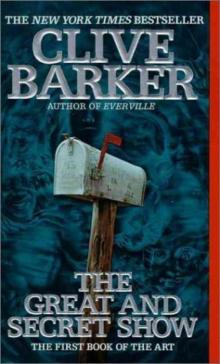 The Great and Secret Show
The Great and Secret Show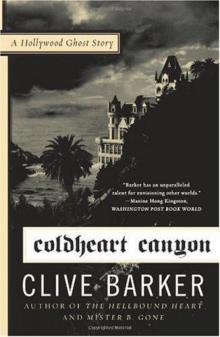 Coldheart Canyon: A Hollywood Ghost Story
Coldheart Canyon: A Hollywood Ghost Story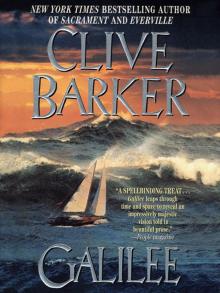 Galilee
Galilee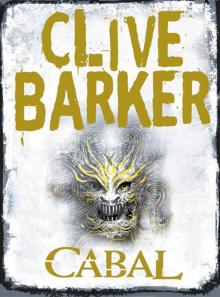 Cabal
Cabal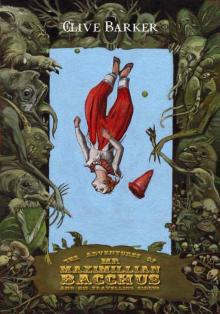 The Adventures of Mr. Maximillian Bacchus and His Travelling Circus
The Adventures of Mr. Maximillian Bacchus and His Travelling Circus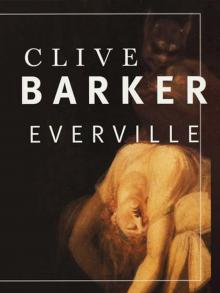 Everville
Everville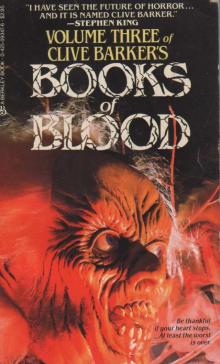 Books of Blood: Volume Three
Books of Blood: Volume Three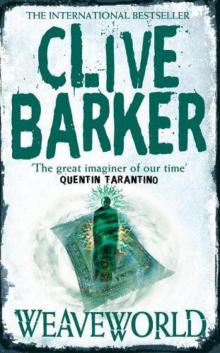 Weaveworld
Weaveworld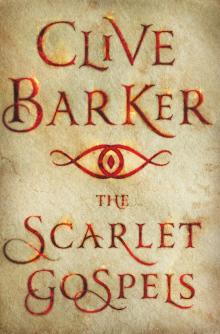 The Scarlet Gospels
The Scarlet Gospels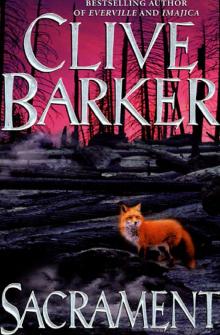 Sacrament
Sacrament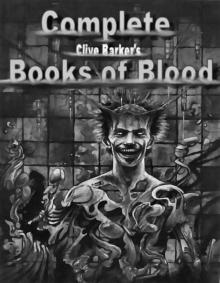 Books of Blood: Volumes 1-6
Books of Blood: Volumes 1-6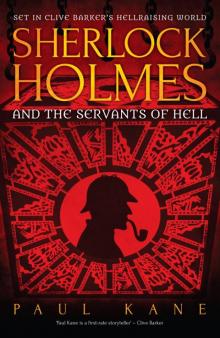 Sherlock Holmes and the Servants of Hell
Sherlock Holmes and the Servants of Hell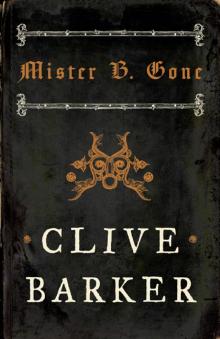 Mister B. Gone
Mister B. Gone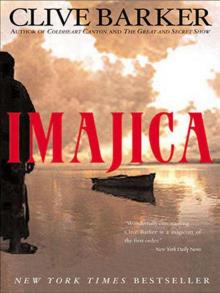 Imajica
Imajica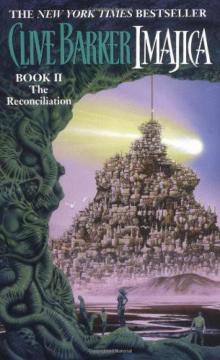 The Reconciliation
The Reconciliation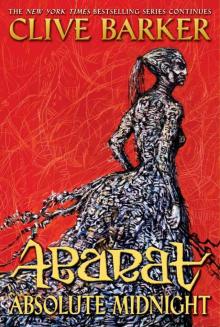 Abarat
Abarat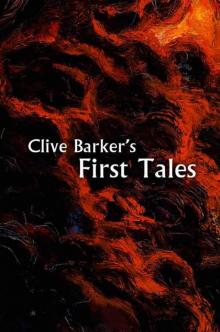 Clive Barker's First Tales
Clive Barker's First Tales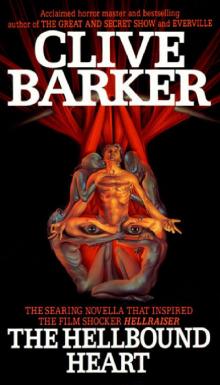 The Hellbound Heart
The Hellbound Heart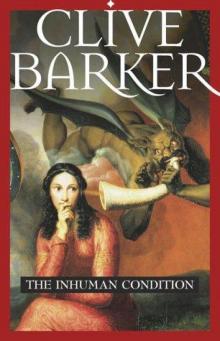 The Inhuman Condition
The Inhuman Condition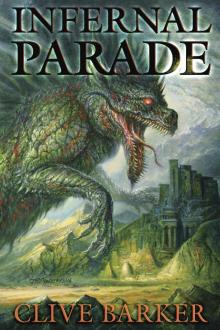 Infernal Parade
Infernal Parade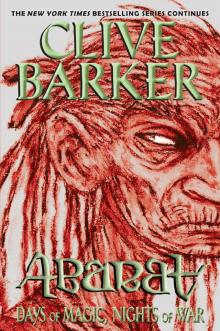 Days of Magic, Nights of War
Days of Magic, Nights of War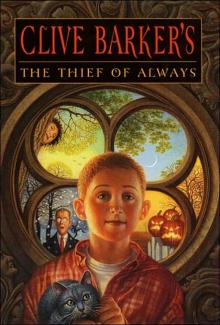 The Thief of Always
The Thief of Always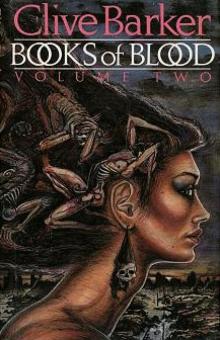 Books of Blood Vol 2
Books of Blood Vol 2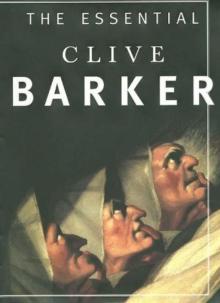 The Essential Clive Barker
The Essential Clive Barker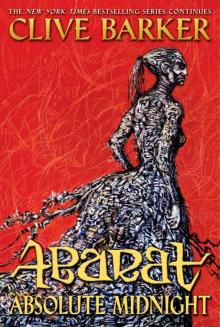 Abarat: Absolute Midnight a-3
Abarat: Absolute Midnight a-3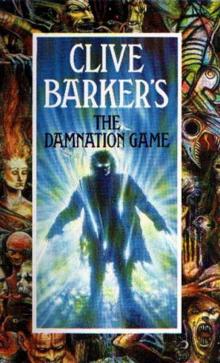 The Damnation Game
The Damnation Game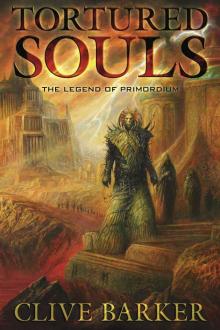 Tortured Souls: The Legend of Primordium
Tortured Souls: The Legend of Primordium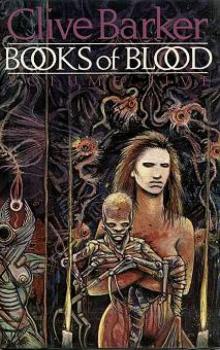 Books of Blood Vol 5
Books of Blood Vol 5 Imajica 02 - The Reconciliator
Imajica 02 - The Reconciliator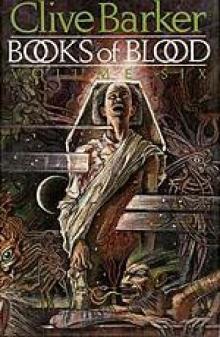 Books Of Blood Vol 6
Books Of Blood Vol 6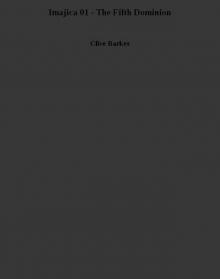 Imajica 01 - The Fifth Dominion
Imajica 01 - The Fifth Dominion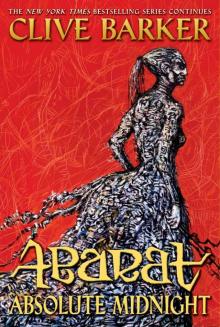 Abarat: Absolute Midnight
Abarat: Absolute Midnight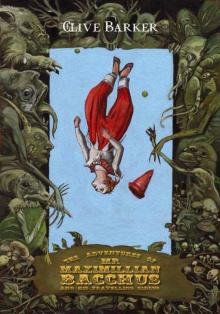 The Adventures of Mr. Maximillian Bacchus & His Traveling Circus
The Adventures of Mr. Maximillian Bacchus & His Traveling Circus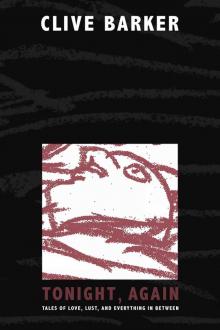 Tonight, Again
Tonight, Again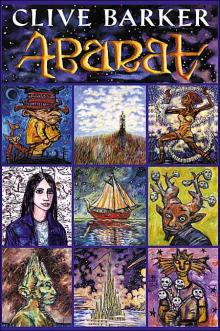 Abarat: The First Book of Hours a-1
Abarat: The First Book of Hours a-1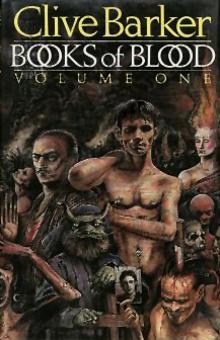 Books Of Blood Vol 1
Books Of Blood Vol 1 Age of Desire
Age of Desire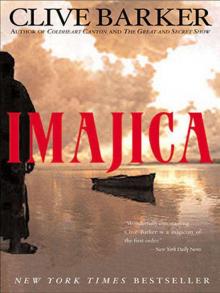 Imajica: Annotated Edition
Imajica: Annotated Edition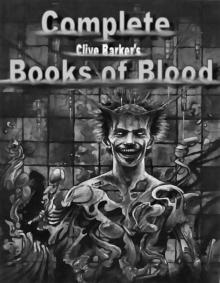 Complete Books of Blood
Complete Books of Blood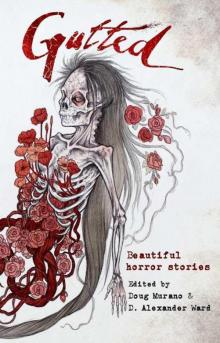 Gutted: Beautiful Horror Stories
Gutted: Beautiful Horror Stories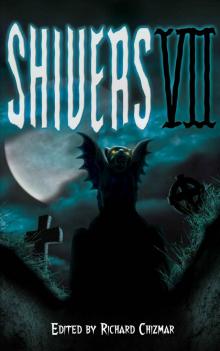 Shivers 7
Shivers 7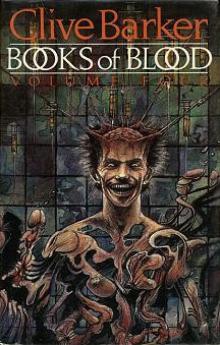 Books Of Blood Vol 4
Books Of Blood Vol 4